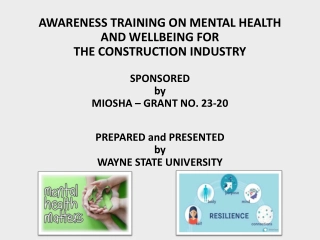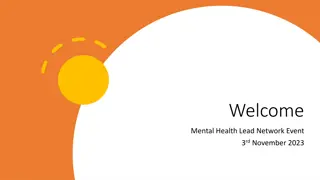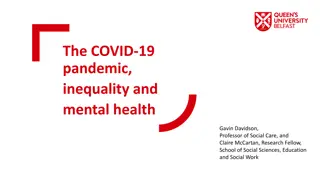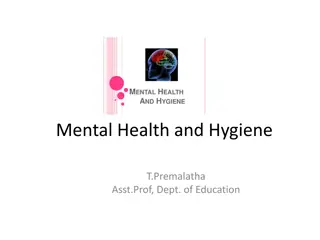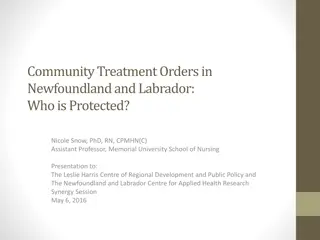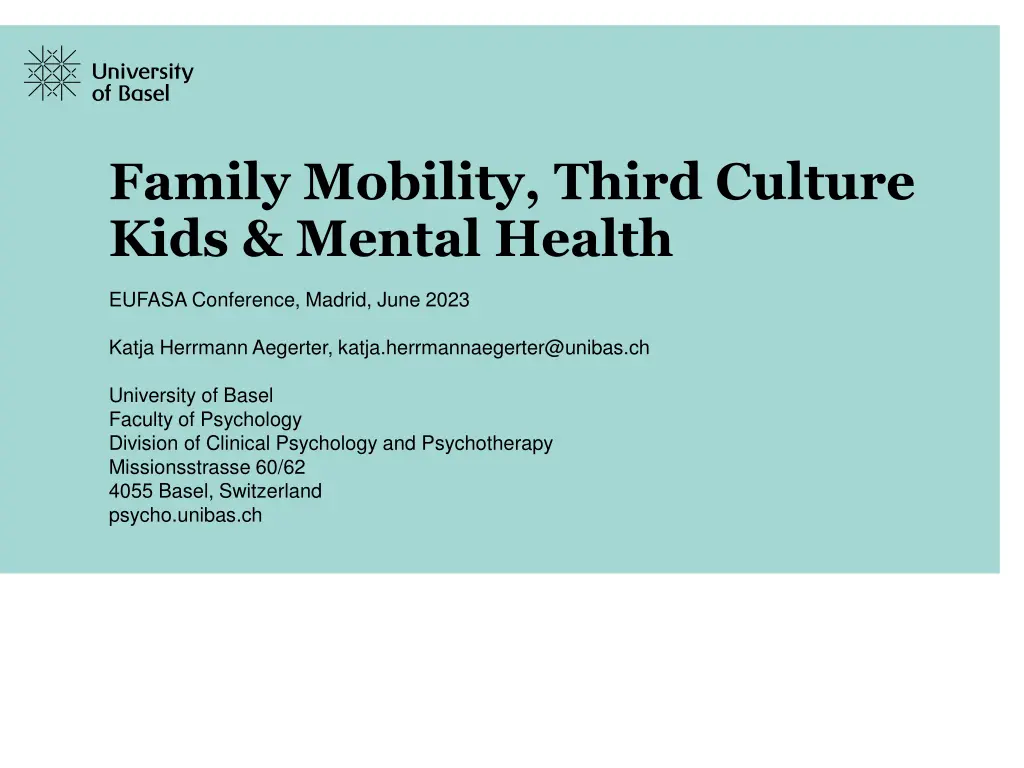
Understanding Third Culture Kids and Their Mental Health Challenges
Explore the world of Third Culture Kids (TCKs) and their unique experiences growing up in various cultures. Learn about the impact on their mental health, the importance of understanding TCKs, and ways parents can support them. Join Katja Herrmann Aegerter at the EUFASA Conference in Madrid for insights into TCK mental health.
Download Presentation

Please find below an Image/Link to download the presentation.
The content on the website is provided AS IS for your information and personal use only. It may not be sold, licensed, or shared on other websites without obtaining consent from the author. If you encounter any issues during the download, it is possible that the publisher has removed the file from their server.
You are allowed to download the files provided on this website for personal or commercial use, subject to the condition that they are used lawfully. All files are the property of their respective owners.
The content on the website is provided AS IS for your information and personal use only. It may not be sold, licensed, or shared on other websites without obtaining consent from the author.
E N D
Presentation Transcript
Family Mobility, Third Culture Kids & Mental Health EUFASA Conference, Madrid, June 2023 Katja Herrmann Aegerter, katja.herrmannaegerter@unibas.ch University of Basel Faculty of Psychology Division of Clinical Psychology and Psychotherapy Missionsstrasse 60/62 4055 Basel, Switzerland psycho.unibas.ch
Agenda. 1 Introduction who am I and what is Home Abroad 2 Third Culture Kids what are they? 3 State of Research how are they doing? 4 Advice how can parents help? 5 Thank you TCK Mental Health, Katja Herrmann Aegerter, 05.06.2023 2 University of Basel
Introduction Basel University Website. Home Abroad Team. Basel University Website. Home Abroad Project. TCK Mental Health, Katja Herrmann Aegerter, 05.06.2023 3 University of Basel
Agenda. 1 Introduction who am I and what is Home Abroad 2 Third Culture Kids what are they? 3 State of Research how are they doing? 4 Advice how can parents help? 5 Thank you TCK Mental Health, Katja Herrmann Aegerter, 05.06.2023 4 University of Basel
2 Third Culture Kids What are they? Definition A person who spends a significant part of his or her first eighteen years of life accompanying parent(s) in a country that is different from at least one parent s passport country(ies) due to a parent s choice of work or advanced training. (Pollock, Van Reken, Pollock, 2017) 3 CULTURES Home Culture 1st TCK Culture 3rd Host Culture 2nd TCK Mental Health, Katja Herrmann Aegerter, 05.06.2023 5 University of Basel
2 Third Culture Kids What are they? Importance of understanding TCKs MOBILE CHILDHOODS - common - beneficial - challenges - immediate or long-term - mental well-being impact - immediate or long-term INFORMATION AND PREPARATION - navigation - empowerment - risk reduction TCK Mental Health, Katja Herrmann Aegerter, 05.06.2023 6 University of Basel
2 Third Culture Kids What are they? Chances of TCKs Challenges of TCKs - - - Expanded Worldview 3D-Worldview Resilience (with the help of caregivers) Adaptability & Blending in Linguistic, Social and Cross-Cultural Skills Open-mindedness High-standard education Many global friendships - - - - - Separation, Loss & Grief Relationships (Family, Peers) Roots & Belonging Identity Adverse Childhood Experiences (ACEs) little academic research Stress Trauma little academic research - - - - - - - TCK Mental Health, Katja Herrmann Aegerter, 05.06.2023 7 University of Basel
Agenda. 1 Introduction who am I and what is Home Abroad 2 Third Culture Kids what are they? 3 State of Research how are they doing? 4 Advice how can parents help? 5 Thank you TCK Mental Health, Katja Herrmann Aegerter, 05.06.2023 8 University of Basel
3 State of Research how are they doing? Emotional Development Adjustment - Struggles of adjusting and fitting in home/passport countries - Adjustment difficulties navigating activities of daily living - Difficulties forming friendships - Being bullied - Particularly difficult when transitioning into college life Mental Well-Being - Psychological impact of the TCK experience not to be understated - Lonelineness, distress, psychological challenges (depression, anxiety, stress, anger upon re-entry) - Re-entry programs: effective interventions (40% reduction in depression, anxiety, stress levels) - Lower self-esteem due to cultural homelessness: buffered by affirmation, belonging and committment - Emotional and mental health affected by the preparation TCKs receive TCK Mental Health, Katja Herrmann Aegerter, 05.06.2023 9 University of Basel
3 State of Research how are they doing? Emotional Development continued Grief and Loss - Significant losses and grief experiences: leaving, multiple goodbyes - Unresolved grief: disenfranchised/hidden losses - Losses relate to people, pets, possessions - Existential losses tied to identity and home - Processed and resolved grief significantly affects TCKs emotional well-being Social/Relational Development Friendships/relationships - Challenge: Forming-losing-reforming of friendships & maintenance of friendships - Friendships as one of numerous TCK issues - Friendship difficulties when repatriating - Characteristics of TCK friendship building: socially-connected, emotionally- connected, functionally-connected: TCKs chose form of relationship with least emotional investment (socially-connected or functionally-connected) TCK Mental Health, Katja Herrmann Aegerter, 05.06.2023 University of Basel 10
3 State of Research how are they doing? Social/Relational Development continued Intercultural sensitivity/competence - TCKs significantly higher social sensitivity - Competent intercultural communicators (despite struggles with sense of belonging) Tolerance/attitude towards other cultures/religions - TCKs more tolerant views toward other cultures - Religious tolerance with desire that all religions would be treated fairly - TCKs as cultural hybrids: TCK worldview orientation capable of holding 2 polarities ethnocentric and ethnorelative TCK Mental Health, Katja Herrmann Aegerter, 05.06.2023 University of Basel 11
3 State of Research how are they doing? Identity Development Belongingness & Home - Prominent theme in TCK literature - Fit in with many groups but lack belonging to any - Primary sense of belonging with other TCKs or in multicultural settings (settings which normalize unconventional identity of TCKs) - Home associated with friends and family (less a geographical location) - Higher cultural homelessness associated with lower self-esteem, buffered by affirmation, belonging and committment Identity Negotiation - Multiple identities and feeling accepted in 2 or more cultures: adaptation by shifting identities depending on circumstances - Challenge: not feeling a strong sense of belonging with desire to belong somewhere - Frequent transitions might disrupt and slow TCKs process of identity development due to lack of stable reference point (impact on psychological well-being) TCK Mental Health, Katja Herrmann Aegerter, 05.06.2023 University of Basel 12
3 State of Research how are they doing? Identity Development continued Cultural Identification - TCKs most comfortable with individuals who share similar international experience - TCK group identity: shared experience from international setting (not typical cultural identification eg. Location, race other categories) - Identity: in-between culture or third culture - TCKs: multicultural identity rather than shifting or confused identities Identity Strategies - Reading and writing as support tool to help TCKs navigate identity-building - Self-help TCK Mental Health, Katja Herrmann Aegerter, 05.06.2023 University of Basel 13
3 State of Research how are they doing? Specific challenges Children s confusion about their role as a result of being raised in different cultures (Rosenbusch, & Cseh, 2012) Young children: loss of home and social network, change of schools, making new friends, learning a new language (Pollari and Bullock, 1988; McLachlan, 2008; Lazarova et al., 2015) Feelings of uncertainty, sense of belonging to a culture and identity loss (Ali, 2003; Moore and Barker, 2012; Rosenbusch and Cseh, 2012) Important risk factors for adjustment problems (Ali, 2003; Van der Zee et al., 2007): - Emotional instability - Ambivalent attachment style TCK Mental Health, Katja Herrmann Aegerter, 05.06.2023 University of Basel 14
3 State of Research how are they doing? Adolescent Development Theory & Third Culture Kids Unique challenges of adjustment to foreign environment (Weeks, et al., 2010): Disruption of the identity formation process during adolescence Concerns related to making friends Fitting in Performance in schools Standing out in host culture because of appearance and behaviours Resources of TCKs - Open-mindedness as key to adjustment (Weeks, et al., 2010) - Secure attachment, emotional stability, high level of social initiative fostered adjustment (Ali, 2003; Van der Zee et al., 2007) - Experience with different situations and people makes it easier for TCKs to adapt to new situations and interact with different people (Moore and Barker, 2012) TCK Mental Health, Katja Herrmann Aegerter, 05.06.2023 University of Basel 15
3 State of Research how are they doing? Crossover effects Expatriates work satisfaction positively affects children s adjustment (Van der Zee, et al., 2007) Effective adjustment of adolescents might lead to longer stays abroad for expatriate family (Weeks, et al., 2010) Little knowledge on the extent of link between demands for children and adjustment of parents (Sterle, et al., 2018) Crossover effects of family stress to children need to be acknowledged and addressed by the family (Lazarova, et al., 2015). TCK Mental Health, Katja Herrmann Aegerter, 05.06.2023 University of Basel 16
3 State of Research how are they doing? Family Resources (1) Family adaptability (2) Family cohesion: - Strongest predictor of quality of life and sociocultural adjustment of expat children and adolescents (Van der Zee, et al., 2007) - Impact children s ability to establish and maintain friendships with other children in host country (Caligiuri et al., 1998) - Emotional support/good discussions, parental sensitivity towards child s specific needs in host country: important facilitators in adjustment process (Caligiuri et al., 1998) (3) Family communication: creates a shared sense of meaning, develop and orchestrate coping strategies and maintain harmony and balance (Van der Zee, et al., 2007) Social Resources - Friends (school), peers who speak their mother tongue (isolation from host culture less of a problem) (Weeks et al., 2010) - Family support and informal networks buffer against depressive symptoms and increase academic performance and persistence (Lucier-Greer et al., 2015) TCK Mental Health, Katja Herrmann Aegerter, 05.06.2023 University of Basel 17
Agenda. 1 Introduction who am I and what is Home Abroad 2 Third Culture Kids what are they? 3 State of Research how are they doing? 4 Advice how to help? 5 Thank you TCK Mental Health, Katja Herrmann Aegerter, 05.06.2023 University of Basel 18
4 Advice How to help? Education for Parents Support through parents Parental Mental Health PREVENTION Education for TCKs Preparation of Families Support through employers TCK Mental Health, Katja Herrmann Aegerter, 05.06.2023 University of Basel 19
4 Advice How can parents help? TCK Mental Health, Katja Herrmann Aegerter, 05.06.2023 University of Basel 20
4 Advice How can parents help? PREDICTABILITY - - - - - - Transparency and open communication (age-appropriate, at eye level) Continuity through school systems / school language Continuity through a home base Maintain routines and traditions Involvement (giving them agency will make them feel important, equal & heard) The bigger their involvement the higher their compromise tolerance. TCK Mental Health, Katja Herrmann Aegerter, 05.06.2023 University of Basel 21
4 Advice How can parents help? FAMILY - - - - Proactive parenting Solid attachment Cohesive and democratic family environment Parental presence and availability (both parents) TCK Mental Health, Katja Herrmann Aegerter, 05.06.2023 University of Basel 22
4 Advice How can parents help? RELATIONSHIPS - Maintenance of relationships with extended family (e.g. grandparents, cousins, etc.). Maintenance of friendships Model the maintenance of distant friendships Allow mingling with like-minded individuals. Model and teach openness - - - - TCK Mental Health, Katja Herrmann Aegerter, 05.06.2023 University of Basel 23
4 Advice How can parents help? ATTITUDE - - - - - - - Space & time to grieve Own attitude Proper goodbye (RAFT) Perfect balance as a parent (professionally and mentally) Time transitions Validate child s stressor Accept your child s cultural mix TCK Mental Health, Katja Herrmann Aegerter, 05.06.2023 University of Basel 24
Agenda. 1 Introduction who am I and what is Home Abroad 2 Third Culture Kids what are they? 3 State of Research how are they doing? 4 Advice how can parents help? 5 Thank you TCK Mental Health, Katja Herrmann Aegerter, 05.06.2023 University of Basel 25
Thank you for your attention. Please do not hesitate to reach out to me: Katja.herrmannaegerter@unibas.ch

